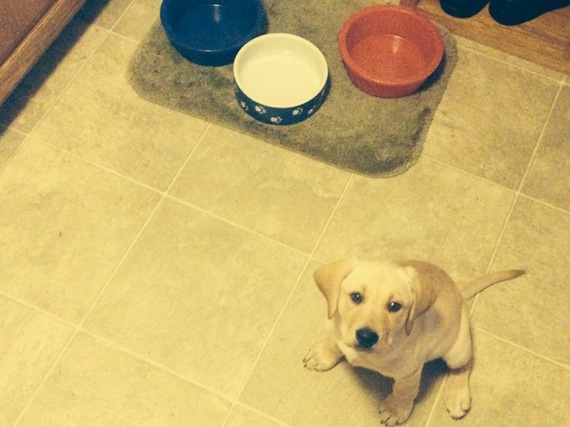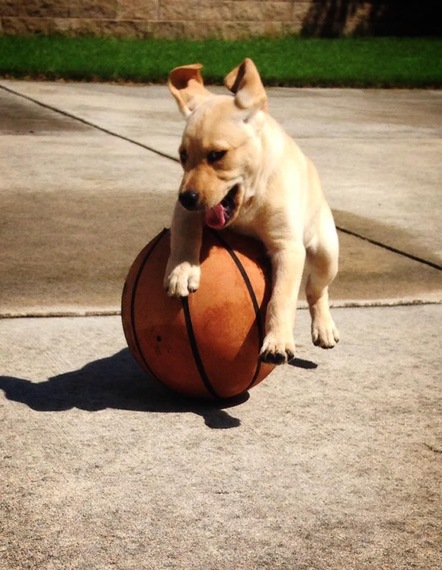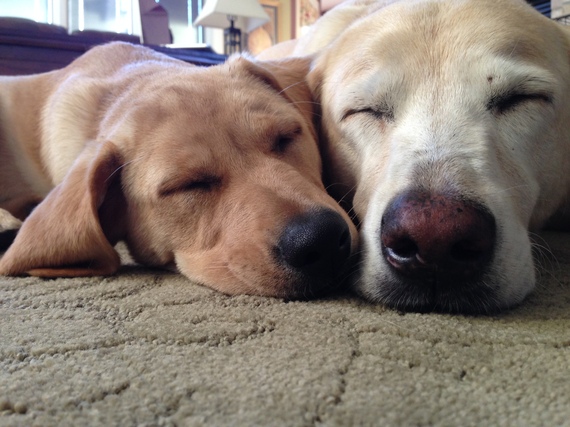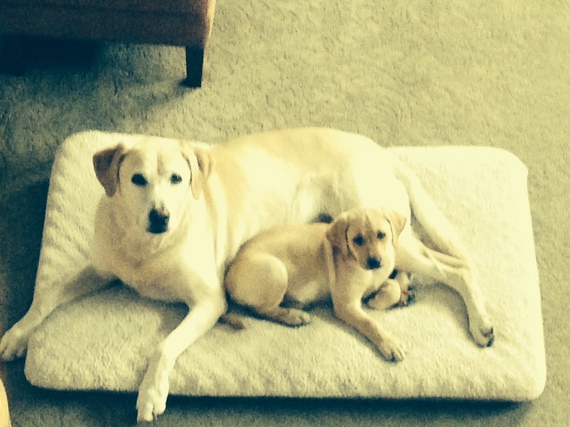There is a new puppy in my life: Liberty Dean (#totesadorbs, #errrmyghad, #there's-a-new-dog-in-town). She goes by Libby for short and she pees on the rug (#naughtylibby!). For a few weeks, her propawsterous puppy piddling was chalked up as normal for her young age. But you can only flip a rug so many times. Her cuteness to naughtiness ratio hit the tipping point and something had to be done. We set out on a mission to change Libby.

Changing Libby's behavior, although frustrating at times, was relatively easy. A soiled rug was met with a quick trip outside and a short stint in puppy jail. A successful trip to the backyard was rewarded with exorbitant praise and playtime. Not surprisingly, she preferred the praise and play and soon was wired to prefer the outdoor bathroom. We molded Libby into an upstanding household member, successfully having altered her behavior.
As human's, we alter our behavior, too, and we do it constantly. Sometimes, we make the alterations intentionally -- our friends suggest, our partner asks, our boss demands we change our ways -- and sometimes we make the alterations unconsciously. We're easily influenced by advertising (You did click this puppy link after all), will mimic other people in our social circle, and are subtly encouraged by society to act one way over another. We do this because we desperately want to fit in with our perceived environment, and like Libby, we prefer praise to scolding, play to punishment, a pat on the head over being ignored.
Now, if you find yourself thinking "this guy lured me in with a cute puppy photo and is baiting and switching me into a society is broken monologue" you are correct, but I assure you this is not a twist on the 'cog in the machine' or 'stick it to the man' rants. I believe in social order, a functioning government, and think we should all play nice and work with each other. My observation is this:
When behavior alteration is framed in this context -- humans altering behavior in pursuit of reward or avoidance of punishment -- it begins to look strikingly similar to domestication.
Domestication is the process whereby a population of living organisms is changed at the genetic level, through generations of selective breeding, to accentuate traits that ultimately benefit the interests of humans. A very scientific definition befitting for a word derived from science. As I am not a scientist -- and I'm trying not to let this spiral into a conspiracy theory -- I am going to table the possibility of purposeful genetic alteration over generations (although I'd very much welcome a scientist's or conspirator's opinion). Instead, lets examine domestication through the lens of something we can all choose to be: a humanitarian.
The domestication of humanity has a nasty ring to it. That's because it means humans are simultaneously domesticating and being domesticated -- humans domesticating other humans to benefit humanity. It results in a circular situation furthering nobody involved and it all stems from our constant behavior altering and our unquenchable obsession with conformity.
We like to think of ourselves as a species of conquerors, supreme beings, the top dogs of Earth, evolving both as individuals and as a society. But domestication and evolution do not go hand in hand; they clash like mustard on ice cream. We cannot alter our behavior and evolve. To evolve, we must transform.
Transformation is to Evolution as Alteration is to Domestication.
When we hear the word 'transformation,' we visualize large, dramatic changes taking place over an extended period. These certainly can be transformative characteristics -- transformations can be major revelations that develop over time -- but transformations can also be minor realizations that happen suddenly in brief "aha" moments. Transformation and alteration do not differ from each other by the seriousness of the change or in the length of time it takes to make the change; rather, they differ in that transformation requires understanding where alteration does not.
Altering our behavior only requires asking 'what' questions. What are other people around me doing? (and what do I need to do to do that, too?) What does my partner like? What does my boss want me to do? They are easy questions to answer: People around you post to Facebook (so I should do that, too), My partner likes when I call them at night, my boss wants me to show up at 8 am and be at my desk until 5 p.m.
Understanding begins when we ask "why," both to ourselves and in our interactions with others. Why are other people around me posting to Facebook? Why does my partner like when I call? Why does my boss want me to be at my desk? These questions are much harder to deal with because you cannot mimic feelings. Perhaps, your partner likes when you call at night because they have trust issues, or maybe your partner likes when you call at night because it strengthens the bond between the two of you, is a place in their day where time melts, and hearing your voice makes everything bad feel good. Wouldn't you agree that is an important difference to understand?
Transformation is difficult because understanding often comes at the cost of your ego. To find and hold onto understanding, you must be willing to deconstruct your own walls, confront awkward emotions, and be open to honest communication about anything. It is much easier to flip the autopilot on and default back to alteration and the path to domestication -- an impulsive state of mind where you don't need to understand, you don't need to feel, and you get rewarded with "good girls" and "atta boys."
"Ego, and awareness of the ego, cannot coexist" -- Eckhart Tolle
Before I step off the soapbox and end the information dump, I ask that you return to our Humanitarian perspective from earlier -- glasses through which we view the world seeking to promote human welfare. Here we begin to see how transformations are the exact opposites of alterations. Alterations are negative, encourage conformity, and feed the harmful circle of human domestication. Transformations are positive, the foundation for community, and guarantee the continued evolution of the human race. It is my belief that domestication has no place in humanity. It is a cesspool where dissatisfaction with life brews. If you are looking for where your life ceased to be fulfilling, look no further than your habitual alterations.



